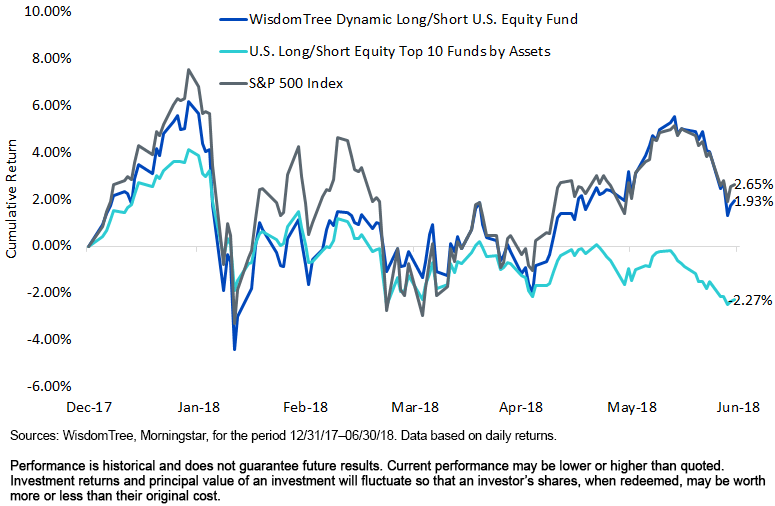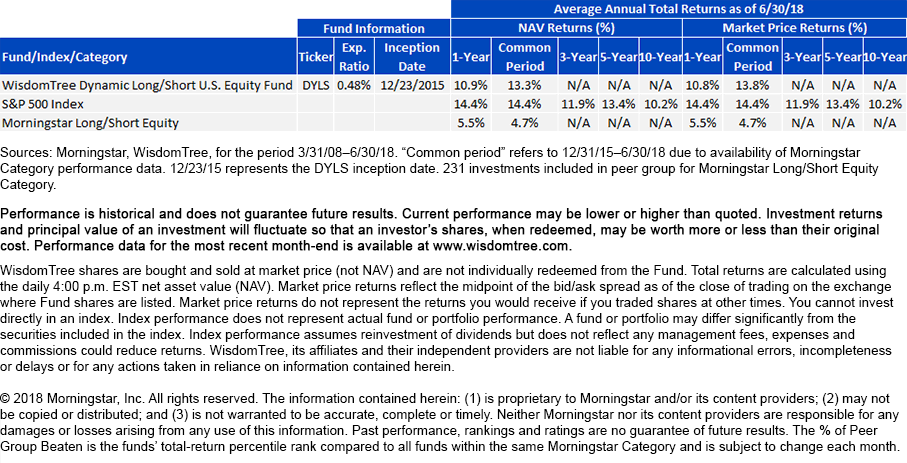Is Your Long/Short Strategy Working?


Many equity investors started the year concerned about valuations, and now with increased volatility, heightened trade rhetoric and a flattening yield curve, more investors are looking for ways to potentially protect their portfolios in case of a larger sell-off. Many strategic asset allocators will remain heavily invested in equities and bonds, through the ups and downs, but allocating a portion of your portfolio to alternative strategies, such as long/short equity, may help smooth out the returns at the extremes.
WisdomTree Dynamic Long/Short U.S. Equity Fund (DYLS)
A little over two and a half years ago, WisdomTree launched two Funds that use a factor-specific process to add value through stock selection combined with a dynamic risk model that adjusts net equity market exposure monthly using hedging instruments. One of these Funds, DYLS, is designed to have net exposure on the market that ranges from being fully invested (i.e., no hedge ratio applied) to fully market neutral (i.e., fully hedged). When underlying fundamentals are strong, there is no hedge ratio applied. When fundamentals become mixed, a partial hedge is applied, and when fundamentals are weak, a full market hedge seeks to protect investors from downdrafts in the equity market while still delivering excess returns through security selection. WisdomTree expects the net beta over time will likely average somewhere between .6 and .7 in terms of how often we believe the hedges will be in place.
We are very pleased with the live results since DYLS’s inception in December 2015. The Fund came out of the gate in its market-neutral position, which turned out to be a great call at the start of 2016. Since that time, aside from a few months, the Fund has spent the majority of its time fully invested, which also proved correct, and it let the fund capture most of the 2017 U.S. equity market return.
We all know that how you protect your returns in down markets or when volatility is increasing by limiting drawdowns (that is, when many expect their allocation to alternative strategies to really add value) is important. In the figure below, we compare DYLS against the 10 largest competing funds in the Morningstar U.S. Long/Short Equity Category. As you can see, year-to-date, many of these funds have failed to add value in this period of heightened volatility.
Year-to-Date Performance

For standardized performance of DYLS, please click here.
As a result of the positive trend in profitability, DYLS was fully invested to start 2018, even though valuations looked a little stretched on our indicator. Although it was the right call to be fully invested in 2017, it proved challenging when the market sold off in late January. The profitability indicator moved to the half-hedged position in March and then back to being fully invested since April, which allowed the strategy to move back into positive territory compared with the S&P 500 Index.
On the other hand, the Morningstar Category found it difficult to keep up with the S&P 500 Index and DYLS, underperforming by 4.92% and 4.20%, respectively. And some of the largest funds by assets in the category have done worse than the composite above. This recent underperformance, coupled with the categories high management fees, is not a recipe for success in our mind. Instead, we prefer a liquid, transparent, lower-cost substitute that can dynamically adapt to the market environment, such as DYLS.
While it is still a short-term period, we are further encouraged that over the two-and-a-half-year period DYLS has been live, the Fund has been able to beat 100% of the long/short funds in its peer group based on total return.
Our friend at Bloomberg, Eric Balchunas, recently commented on a podcast that alternatives and “hedge fund lite” strategies are the next frontier for the ETF world, but he implied that one had to wait for the notable and reputable long/short managers to enter the space. WisdomTree believes DYLS is a compelling proposition in the marketplace already, and one does not have to wait to see if these other firms will actually enter the market.


Important Risks Related to this Article
There are risks associated with investing, including possible loss of principal. The Fund invests in derivatives, including as a substitute to gain short exposure to equity securities. Derivative investments can be volatile, and these investments may be less liquid than other securities, and more sensitive to the effects of varied economic conditions. Derivatives used by the Fund to offset its exposure to market volatility may not perform as intended. The Fund may engage in “short sale” transactions and will lose value if the security or instrument that is the subject of a short sale increases in value. A Fund that has exposure to one or more sectors may increase the Fund’s vulnerability to any single economic or regulatory development. This may result in greater share price volatility. The composition of the Index is heavily dependent on quantitative models and data from one or more third parties, and the Index may not perform as intended. The Fund invests in the securities included in, or representative of, its Index regardless of their investment merit, and the Fund does not attempt to outperform its Index or take defensive positions in declining markets. Please read the Fund’s prospectus for specific details regarding the Fund’s risk profile.


